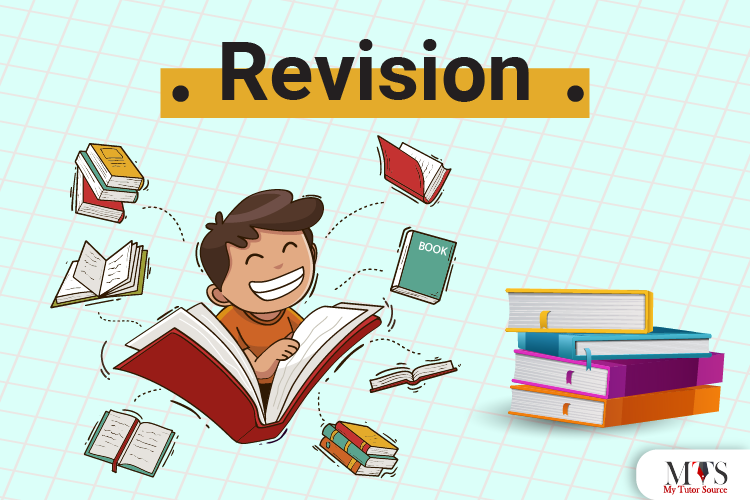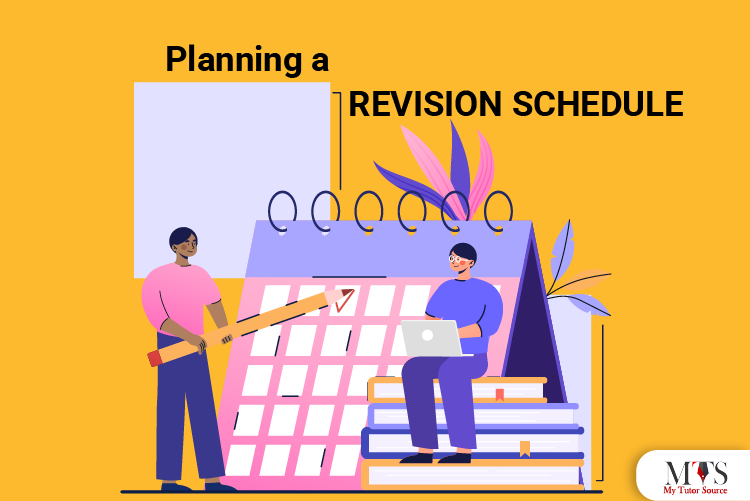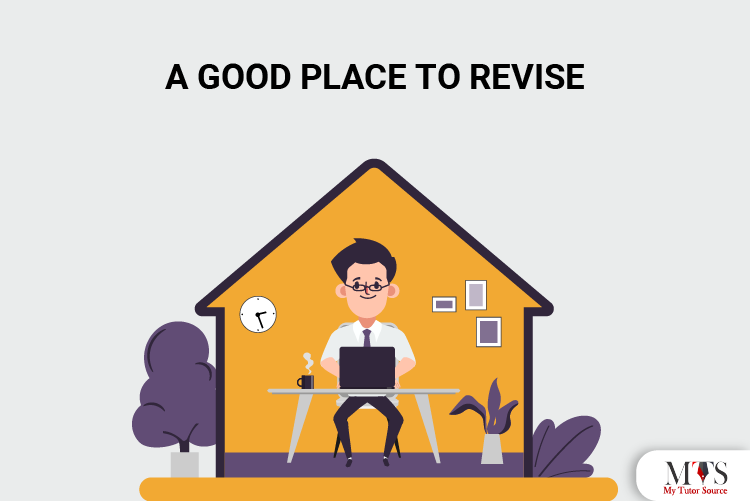

If you are preparing for exams, you need to have your preparation right on point in such a way that it helps you attempt your exam perfectly. If you aim to ace your exam, you will have to prepare and then go through your preparation again. This is referred to as revision. Revision is an essential step in exam preparation.
Here we have discussed how to prepare for exams and what impact revision will have on your preparation and on your results.
We have addressed almost all the concerns students face while preparing for their exams so that they can use these tips and information to prepare for their exams in the best possible way. If you still encounter some questions about your preparation, our certified private tutors are available to help you prepare for your examination.
When you are done preparing for your exam, you need to revise. The question is when to revise, how to revise, what to avoid when revising, and what should be done to revise better.
If you are revising in the right way, you can be well prepared to attempt your exam without suddenly forgetting if you studied a particular topic or not. When this happens, you can get frustrated because you’ve studied it but are unable to remember it correctly.
Let’s talk about some ways through which revision can prove to be helpful for your exam preparation.
The strategy you choose matters a lot for your preparation and revision. There are mainly two types of revision strategies that students go for, including Active revision and Passive revision.
This is the type of revision that requires the students to thoroughly analyze their preparation, know about what they have learned so far, and what areas require more attention. Active revision is done by research and observation.
It is basically the analysis of knowledge. It keeps the students active and engaged in their studies. They are eager to know what they need to learn afterward rather than simply reading out the same thing over and over.
This is the type of revision that requires students to write, make notes, and read them over and over. Passive revision requires a student to copy the written material and keep on reading it until they have memorized it well. This will help the students to get a strong grip over a certain concept, but as they have not studied other aspects of that topic in detail, the students will not be able to use that information properly.
OUR RECOMMENDATION
We recommend that you go for the style of active revision when you are done with your preparation. Active preparation enables you to not only study the areas you are done with it also allows you to know about what else you need to prepare. This detailed observation will help you engage more and learn more actively, so you won’t forget what you learned when you need to write about it during the exam.
On the other hand, passive revision helps students to memorize a topic by reading and writing it again and again, but when they are required to write a more detailed aspect of that topic, they will not have enough knowledge to support their answers because they had revised only that specific part they memorized.
Hence it is recommended that if you are planning to revise what you have learned, you should choose an active revision approach rather than a traditional passive revision approach.
If you are studying one subject or one topic for a longer period of time or a whole day, you will soon be exhausted, and you won’t be able to keep your focus straight. This is why it is essential to study different subjects throughout the day. It will prove to be refreshing for your mind. Revising different things throughout the day will keep your brain active instead. If you are on a single subject all day long, there will come the point when you might be reading, but it will not have an impact on your learning because you get tired of learning one thing constantly.
If you really have to revise one subject only, then don’t remain on a single topic for a long time. Cut down the subject into parts, and set a particular time for each topic. This way, you get to revise all topics without spending extra time on a single topic because you got bored and have not revised it fully.
You can check your preparation by testing yourself. This is the best way to determine how well you have prepared for your exam. A simple way to do this is by asking yourself random questions related to your exam. Check how well you are able to answer them. If there are some questions that leave you totally blank or a bit silent, then these areas require attention, and you need to revise them well before you attempt the real exam.
Here are some ways that you can determine how well prepared you are through testing yourself:
Ask yourself questions:
Randomly ask yourself questions about your exam like you would ask someone else who is about to take an exam. This will help in two ways. Firstly it will enable you to think beyond what you have studied because you want to test yourself, and secondly, while answering these questions to yourself, you will know how well you have prepared for it.
Solve exercise questions
When you are studying from either books or online platforms, you will do some unsolved exercises at the end of the lesson. These exercises are related to the lesson you have studied. Solving the exercise will help you to know how well you prepared for the exam. It is a way of self-evaluation through the questions given to you.
Make someone ask you questions.
When you feel like you have prepared for your exam, ask a friend or someone else to ask you a random question about the topic you have learned. When they ask you the question, answer them with what you know or what you will be writing if you find this question on your exam paper. In this way, you will analyze how well you are prepared. Not only will you be analyzing, but the one who asked you the question will also check how well you have answered.
Solve past papers
When you think that you are done preparing for the exam, pick up a past paper of that subject and solve it like a real exam in the time you will be given during your real exam. This will help you know how you would perform if this past paper was your real exam. If you do not have enough time to solve the whole paper, just analyze and check how much you know from the questions given and how much you will be able to solve if you are given this paper as a real exam.

Although there are different learning styles, aims, and abilities associated with each student, there are several techniques that anyone can try and use the one that suits best according to their needs. Here we have listed some tips based on different learning techniques. You can use the ones you find right for you.
Are you struggling to focus straight even when you want to learn and revise? This might be because you have run out of motivation to go through a topic once again after you hardly completed it once. This lack of motivation could lead to not doing so well in your exam even if you thought that you prepared well by studying one time.
It can happen when the topic you are studying is too dry or seems boring while the outside world seems rather fun instead, and your motivation to keep on studying the topic until you are well prepared just goes away.

If you are planning on revising a topic once again, you need the right motivation to do so, so that you don’t have to face any learning blocks while studying.
Here we have discussed some points that can help you boost your motivation during revision.
The first step of revising is to decide how to start your revision. If you are starting in a way that can bore you instantly, you will not be motivated to continue studying with the focus that is required for optimum learning.
Choose the topic or subject that you find rather easy and interesting to learn. When you are learning and revising a topic with rather ease, it makes you feel more confident. Thus it leads to being motivated to learn everything.
Timings are also important for your study motivation. Suppose you decide to start revising after you have been exhausted and sleepless, then you will not be motivated to revise from a fresh mind. You should start revising when your mind is fresh. If you are sleepless, then take a nap. If you are exhausted, take a break, and afterward, when you feel fresh, then start revising.
Try to work around a proper schedule. Make revision a regular task in your routine. Set up a time when you will simply revise what you’ve learned. This time should be decided carefully so that you can utilize it daily without any interruptions. If there are breaks or obstacles in your schedule, you will not be able to build up a strong motivation to revise daily. You will revise one day in the right way, but the next day you will lose your motivation.
For this reason, there should be a proper schedule that you can follow to revise. A schedule keeps you motivated because you know what you are going to do at that time slot.
When you are losing your focus but still want to revise with maximum attention, then you can encounter some obstacles that you need to fight off in order to continue revising with motivation. Some major obstacles that you can come across while revising include boredom—procrastination, unable to understand, and more.
Here we have discussed some ways through which you can fight off these obstacles for an enlightened revision session:
You need to plan a revision schedule before you start. Starting randomly can lead you to face learning obstacles earlier than you should. Let’s discuss some way through which you can plan an ideal revision schedule as per your learning goals and needs.

Keep a check on your exam dates. As the dates are approaching, you will need to tighten your revision schedule. Hence you need to start learning and revising beforehand. Let’s suppose your exams are coming in a month’s time frame. As per your learning abilities, styles and goals, you can set up a time slot for mere learning for a few days and then add up a schedule for revising what you have learned and determining what you need to learn.
There are always some subjects that you will find easier than others and some subjects that you might even dread to start. The best way to make this situation work right is to make sure what subject you want to start before the other.
Start with the subject that you find easy and comfortable to work with. This will help you in building up motivating energy within yourself. When you feel like you are revising and learning well, you are readily motivated to learn everything. On the other hand, if you start with a tough subject, it can help if it’s cleared away in the beginning, but if you get stuck at some point, your motivation to revise other subjects can decline.
Depending on your learning style, prioritize which subjects you would like to start first and which subject you will be revising later. This will help you manage your time better, and in this way, you can revise more in an easy way. Otherwise, you will be left with clutter, with no management of time, and you will be left with many topics that you wanted to cover but couldn’t because of lack of time.
If you want to revise it all and to make sure that you have gone through all the important stuff, you need to manage it right. The perfect way to do this is by writing down the schedule. Decide the time you are going to give each subject or a particular topic. After planning it out, write it down somewhere so that it stays in front of you to remind you of the time that you need to manage. This will help you accomplish your revision goals in the right manner.
In order to start with a schedule, try to make one for a shorter period of time. For instance, you can make one for a day or a week instead of directly jumping on making a schedule for a month. If you are planning for a longer run, in the beginning, you will have to wait for more to feel the motivation of accomplishment. When you plan for a shorter interval, you will come across small accomplishments that will motivate you to learn more instead of getting exhausted and stopping.
When you are planning a schedule to revise, make sure to bring variations in the daily schedule—study different subjects in a day. If you are revising a single subject for a longer time period, you will get bored of it, and eventually, you will lose interest in it. Instead, if there’s variation in the subjects, you will have the option to change the subject if one of them gets a bit overwhelming. In this way, you will be able to study more attentively without getting distracted by boredom or other external factors that can lead to exhaustion and less productivity.
For instance, you can set up a few hours studying mates and a few hours for biology and using this way, you can form up a whole schedule that works for you.
Are you preparing for your exams, and you are confused about the time as to when you should shift from learning to revising? We are here to help you with this confusion.
As much as you might think that you will revise during the last miniature, there are greater chances that you won’t be able to do so because, without a proper scheduled plan, you won’t be able to start at the end.
If you feel like it might be too early to start revising what you have learned, we are here to tell you that it’s not. Revising side by side is always a good choice because leaving it to be done in the end simply makes it feel like clutter. Hence while you are learning, make up a schedule to revise alongside.
When you are making a schedule for revision, make sure that you plan it according to your routine schedule. If you are attending school, then your revision time period will be shorter, i.e., for a few hours, but if you have a weekend off or you are on holiday, it means you have time to revise with ease instead of revising in a rush. During these free time days, you should make sure that you are revising for a longer time period, like 5 to 6 hours.
Hence according to your studying schedule in the daily routine, you can set up a schedule for revision as well.
Make sure that the schedule you have set up is easy to follow, so you don’t lose your focus while revising. If you have set up a time for revision when you usually have other commitments like going out with family or friends, then it will be difficult to concentrate and revise instead.
This is very important that you revise in a place where you are neither too relaxed nor too uncomfortable. As much as unnecessary it might seem, the pace where you sit down to revise is very important. Suppose you sit on your bed and start revising while sitting there. You will start to feel less active and a bit drowsy in no time. You might even fall asleep for a while. This will not be helpful in building up a focus. On the other hand, if you choose a place from another extreme, like sitting in the cold outside during winter days. This can also lead you to lose focus without any reason just because you didn’t choose the right place to revise, even with the motivation and right study material.
You also need to check for distractions around you. If there is much noise and movement around you, you will not be able to keep your focus straight.
Hence it is very important to choose a moderately right place to start revising so that you neither get too comfortable nor too distracted by the environment in order to start revising for a productive outcome.

Your study area where you will be preparing, learning, or revising should be perfect, just like how you need it to be. When your study area is ideal, you can have a productive revision session. Here are some factors that you need to consider in order to improve your environment for revision.
NOISE
When you sit down to revise, you need to concentrate fully in order to make sure that you don’t forget what you studied during your exam. This requires you to have a quiet and peaceful environment with minimum noise from the surroundings.
LIGHT
The place where you are studying should be well-lit. There should be moderate light in a way that it’s neither too bright nor too dull to study because both of these factors can make you lose focus or it can cause a headache.
ORGANIZED SPACE
A cluster of things around you will not let you concentrate properly on your revision. You need to sit where the space is neat and properly organized. Even if there’s not much space, it should be clean.
Make sure to add the things in your study place that will help you to have a productive revision session. Some students study better while sitting at a desk. Some prefer to have some plants placed near them. Some require natural light coming in. Whatever makes you feel more productive and active, try to add it to your study area for better motivation.
If you are unable to find a good study place at your home or if it gets too comfortable at home, try looking for a good space in a school or a local library near your home where you won’t have any external distractions to take your focus away.
Try to minimize the distractions around you as much as possible. Anything, big or small, that can distract you from concentrating on your revision should be removed from your sight. Currently, as much as mobile phones help us to find relevant study material, it has become a great tool of distraction for students.
You might have picked up the phone just to check an answer online, but moments later, you will realize that you are distracted and checking other things on your phone. We would suggest that you keep your phone far away from your sight and reach it when you sit down to revise. Even when it’s away but in sight, it becomes hard to resist the urge to check your phone.
If there is any music playing around, or any other destructive factor, make sure to remove it before you sit down to start studying.
When you are revising what you have learned, make sure to take short interval breaks in between to help you keep your mind refreshed. Studying continuously for hours without a break can be very hectic. Take a break where you move out of your study area for a while. Changing the environment that you are sitting in can help you to improve your focus and productivity. When you are sitting in the same place for a longer time period can leave you feeling exhausted and bored. You won’t study with a fresh mind, and the info you add to your mind while learning will not stay there for long. Hence your revision will go to waste even while sitting consistently for hours. Small breaks are necessary.
Let’s talk about how different forms of a break during studying can help your revision.
Taking a break is very important, especially when you have been exhausted while studying for a longer period of time and sitting at the same place. One of the main benefits of taking a break is a boost in concentration.
Here are some reasons why taking a break is good sometimes:
When you decide to take a break, there are several things that you can do to refresh your mind instantly to help you increase productivity. Here are some activities that you can consider for your break:
As much as it is important to take a break while revising, it is also important to keep a time check during your break. Set up a time period for your break and come back to revise within that time slot so that no time is wasted. Try those activities that would not catch up your attention for more than the allocated time slot.
If you use more time than the allocated one, then you will have to cut off the next break from your schedule in order to keep up with the learning goal.
Creative subjects include essay-based questions. If you are revising for a creative subject that requires you to think out of the box to write your answers, then we have some tips on how to prepare for these subjects.
If your exams are near and you are getting panicked about their preparation, then know that the stress will only make it difficult for you to learn with full learning capacity as you would with a free and relaxed mind.
While preparing for your exam, do not overthink about the result or what the outcome will be, just have maximum preparation and give your best, and then leave the stress of the result to the examiner afterward.
When you are stressing too much, you won’t be able to grasp the concepts no matter how many times you revise one thing. It will not sit in your mind for enough time for you to write clearly about it in the exam.
Hence we emphasize greatly preparing for exams without thinking about how you will perform or what will be the result in order to prepare freely.

If you are unable to plan a good revision session on your own, then you can simply get help from someone who can guide you towards a perfect revision pathway. This can enable you to have a different learning approach, especially when you are feeling stuck and unable to revise something even when you read it over and over again.
The best way to get guidance during revision is to book a session with a private tutor who will offer you personal attention to help you learn according to your own learning goals and abilities. The tutor uses creative ways, and when required, they will change their approach in order to make sure that you don’t get stuck anywhere while revising.
When you are revising a hard exam, sit together with your friends before the exam and go through the things and concepts that you all have studied. In this way, you all will share different learned concepts from a different perspective, giving you the option to learn from the better one.
Other than your friends, you can also ask for help from your family. Your siblings or parents or any other member of the family can offer a different learning approach to help you revise better.
When you learn a lesson, look for its relevant information on the internet. There will be articles, journals, slides, or video lectures related to your lesson. With these sources, you will get additional lesson notes and maybe another approach to help you learn if you are stuck while learning.
Revision is one of the most important parts of attempting an exam. When your exams are approaching, you start studying and learning about them. Whatever you learn during your preparation, you will get a stronger grip over it only when you go through it again. This is referred to as revision. You should be revising in the right way to make sure that whatever you learn while revising stays with you till you attempt the exam and write about it.
Revised knowledge not only stays with you only till the exam, it stays with you forever if you have learned through concept-based learning.
If you are looking for help during revision, our online or private home tutors offer personalized lesson plans to help you learn better.